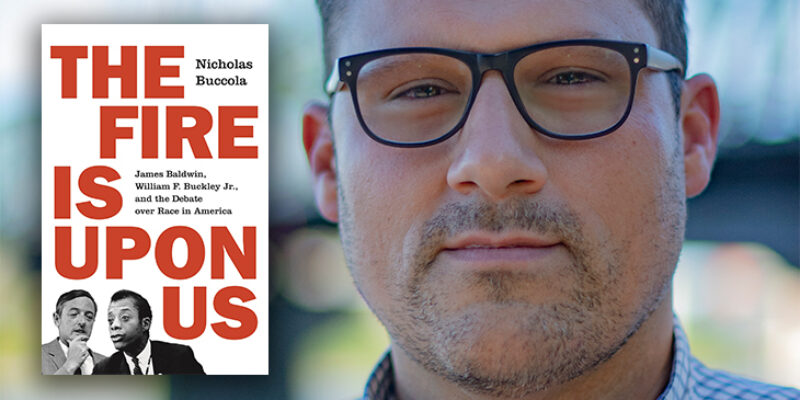A Confrontation with the Color Line: The Baldwin-Buckley Debate, 55 Years Later
Review of Nick Buccola's lecture: Baldwin, Buckley, and the Debate Over Race in America at Town Hall Seattle
Written by TeenTix Newsroom Writer Alison Smith and edited by Teen Editor Olivia Sun

When William F. Buckley and James Baldwin debated each other at Cambridge University in 1965, the auditorium was packed. It was during the height of the Selma campaign and just six months before the Voting Rights Act was passed. As Nicholas Buccola, author of The Fire Is Upon Us, described on February 27, 2020, at Town Hall Seattle, students crowded together on the floor. All were there to see Baldwin, a legendary writer and civil rights advocate, debate Buckley, one of the chief architects of modern conservatism. In his talk, Buccola traces the two men’s upbringings and intellectual journeys that led them to the debate stage to spar over the question, “Is the American Dream at the expense of the American Negro?” In the process, he exposes truths about race relations that still feel relevant 55 years after the debate.
Like any properly interesting debate, the Baldwin-Buckley one is a study in contrasts. Buccola teases apart the differences in the upbringings of these two formidable and influential intellectuals. Baldwin grew up poor in Harlem, and described his household with his eight siblings as “claustrophobic.” Buckley, on the other hand, lived in an expansive estate in Connecticut, and was treated to private tutors and lessons in everything from ballroom dancing to apologetics. The rarefied privilege of Buckley’s upbringing, and the deprivation of Baldwin’s, shaped their views on whether the “racialized hierarchy” was justified and innate, or cruel and discriminatory.
In Buccola’s analysis, Baldwin’s career was largely devoted to finding a way out of the despair that his father struggled with by diagnosing and prescribing a cure for America’s ills. Buckley, on the other hand, focused on reaffirming what he called the “individualism” his parents instilled in him.
Over the course of his talk, Buccola illuminates the contours of Buckley’s “sophisticated racism.” Buckley may have worn nice suits and employed a fancy vocabulary, but he was still propping up white supremacy. In one article for The National Review, the conservative magazine he founded, Buckley wrote that many in the South viewed the 14th Amendment, as well as the 15th, as an “inorganic accretion.” Buccola wonders aloud whether Buckley would be similarly suspicious of the 13th Amendment. Throughout his talk, Buccola obliterates the distinction between Buckley’s “respectable” racism and that of white people rioting in the streets and beating up Freedom Riders with steel knuckles and baseball bats. Although Buckley styled himself as an alternative to the coarse bigotry of George Wallace and Strom Thurmond, Buccola points out that he actually shared many of their values. Buccola doesn’t quite eviscerate Buckley’s arguments, but he does point out their logical inconsistencies.
Unlike Buckley, Baldwin never masked his essential truths in fussy language. Instead, he cuts right to the heart of the matter. His truths are uncompromising; his wisdom is accessible. In his speech to the students at Cambridge, and in his writing in general, he devastatingly outlines the psychological landscape of oppression. For young people, Buccola's talk could inspire them to speak out against injustice, to figure out what cause needs a voice, or to think critically about the inequalities they see around them. In his talk, Buccola quotes some of the opening lines of Baldwin’s speech at Cambridge:
"It comes as a great shock around the age of 5, or 6, or 7, to discover that the flag to which you have pledged allegiance, along with everybody else, has not pledged allegiance to you. It comes as a great shock to discover that Gary Cooper killing off the Indians, when you were rooting for Gary Cooper, that the Indians were you. It comes as a great shock to discover that the country which is your birthplace and to which you owe your life and your identity, has not, in its whole system of reality, evolved any place for you."
Overall, Buccola’s talk offers many jumping-off points for introspection and comparisons to modern-day politics. Although to the modern observer, Baldwin was standing on the right side of history while Buckley was resisting progress (indeed, Baldwin won the debate 540 to 160), both men have something to teach us. Buckley makes us wonder what 21st century “respectable racism” looks like. Baldwin inspires us to question our national mythos and investigate who the ideology of the American Dream really benefits. Together, their debate lives on as a crucial, ever-relevant confrontation with the color line.
"Nick Buccola: Baldwin, Buckley, and the Debate Over Race in America" was part of Town Hall Seattle's Civics series. The lecture took place on February 20, 2020, and is now available online. For event information see here.
Lead photo credit: Author Nicholas Buccola and his latest book The Fire Is Upon Us. Courtesy of Town Hall Seattle.
The TeenTix Newsroom is a group of teen writers led by the Teen Editorial Staff. For each review, Newsroom writers work individually with a teen editor to polish their writing for publication. The Teen Editorial Staff is made up of 6 teens who curate the review portion of the TeenTix blog. More information about the Teen Editorial Staff can be found HERE.
The TeenTix Press Corps promotes critical thinking, communication, and information literacy through criticism and journalism practice for teens. For more information about the Press Corps program see HERE.


